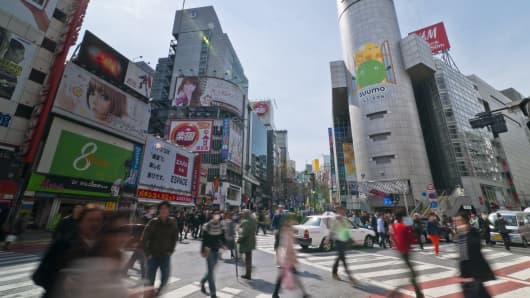Kyle Bass hopes he is wrong, and so may everyone else, as the danger predicted by the founder of Dallas-based Hayman Capital is nothing less than a full blown financial crisis in the world's third-largest economy, Japan.
While the hedge-fund trade of the year has been to short the yen and buy Japanese stocks placed for an export boom, Mr. Bass sees in "Abenomics" – stimulus from Japan's new prime minister Shinzo Abe – signs of stress that he has been predicting for three years.
The length of that call might see him labelled as just another bear pushing a tired case. Shorting Japanese bonds has been the "widow-maker" trade for a decade: as interest rates moved ever lower it destroyed investors betting on a rise.
Mr. Bass, though, predicts more than higher yields: "They will have a bond crisis in the next couple of years. A bond crisis doesn't mean spread widening. It means they lose control of rates and their currency."
(Read More: Volatile Bond Markets Puts Bank of Japan in Spin)
Yet Mr. Bass is no kook or perma bear, the investing equivalent of a stopped clock. He has form as one of the select group who predicted and profited from the housing crash in 2007. According to investors, his $1.5 billion hedge fund has averaged after-fee returns of 25 percent a year since 2006.
He is also mostly long, investing in securitized credit, and such things as bank loans issued by SuperMedia, a legacy Yellow Pages-style business.
He demurs on the details of his Japan bets, but the suggestion is option positions that, like those on pre-crisis mortgage-backed securities, trade at the wrong price. Mr. Bass says: "What's funny is that we're pricing optionality on the risk-free rate using the risk-free rate as an input. So, basically, the outcome of that formula at secular turning points is just wrong."
For Japan, that turning point is approaching, and to explain why he turns to Bernard Madoff, the U.S. mega-fraudster. "As long as you have more people entering than exiting, you can maintain any kind of fraud, lie, or non-payment of obligations."
(Read More: Japan's '3 Arrows' May Run Into German Wall)
What previous Japan bears missed, he says, was the mechanisms funding Japan. Current account surpluses ran at 3 percent to 6 percent, and fiscal deficits used to be only 3 percent of economic output. Meanwhile, Japanese savers reliably bought JGBs.
However, the population has peaked and spenders now outweigh savers, the current account surplus has almost gone, and the budget deficit has ballooned to 11 percent of gross domestic product. "The entire mechanism by which they fund themselves has literally changed overnight," he says.


